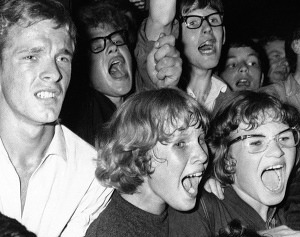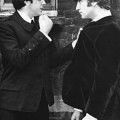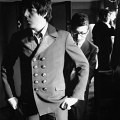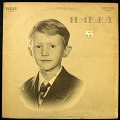- From Faith Current: “The Sacred Ordinary: St. Peter’s Church Hall” - May 1, 2023
- A brief (?) hiatus - April 22, 2023
- Something Happened - March 6, 2023

Is everybody seeing the same thing? Even close?
Commenter Linda asked a provocative question this morning which I felt was worth its own post. I’ll paraphrase it: Do you think that female Beatle fans see the relationship between John and Paul more clearly, more accurately, more totally than male Beatle fans do?
Here’s Linda’s comment:
Do more women than men see the John and Paul relationship for what it really was? That is, not simply a “rivalry” or two “business partners” who were “very different” and just about every other person in their orbits were more important to them than each other, but rather two creative partners, who were equal in every way, with just as many similarities as “differences”, and more importantly, had a deep bond that resembled a marriage. Is it possible that more women acknowledge that as fact? Just wondering.
When I was at the Fest for Beatles Fans in October, I listened to a panel of Women Historians speaking on the group. Near the end, I asked these four female Beatles fans something like, “Do you think your experience as female people gives you any special insights into The Beatles? Do you think going through the world as a woman impacts your fandom in any definable way?”
The panelists answered the question in terms of sexual attraction, which was perfectly valid… but not quite what I’d hoped. Afterwards I talked to a couple of them, and in this informal non-mic’ed setting it was clear that the Beatles represented to all of us a kind of personal freedom, an acceptance of expression, that remains one of their most powerful attractions. In a world still struggling with Patriarchy, female Beatles fans might be like people in Russia, dreaming of freedom as they listen to smuggled copies of Rubber Soul.
This “sound of freedom” aspect is perhaps second only to the music, in terms of the Beatles’ legacy. I believe that you can draw a line — and a pretty damn straight one, too — from the Fabs’ shattering America’s standards of masculinity in 1964, to our current world of increasing tolerance and acceptance in areas of gender and sexuality.
Naturally each of us comes to the Beatles in our own way, and receives different things from them. What role does gender play, do you think? Have at it, commentariat.













I wrote a blog article called John and Paul, which you read a while back, Michael. In it, I speak to the same thing Linda is feeling in the connection with John and Paul. So, I am one man, anyway, who sees that bond. And yes, it was as deep or deeper than any marriage. To speculate about whether there was sex involved is to miss what is more poignant and significant between the two. Here is the link to the blog.
http://nosuchthingasastraightline.wordpress.com/2011/09/10/john-and-paul/
Excellent, @Chris. I’m sure people will enjoy that post.
That’s a great post, Chris — I think you get the balance of John’s needing a “mirror” and Paul’s needing an anti-authoritarian catalyst just right.
I don’t believe there’s any real doubt that Lennon and McCartney were each other’s primary emotional (not sexual) focus until the late 60s, and when that changed the group ended. It’s more complicated than that, certainly, but it’s important that the band didn’t survive their forming primary emotional ties elsewhere.
As to whether women understand John and Paul “better,” I’d say “no.” I’m always uncomfortable with sweeping generalizations, and Chris, your post makes it clear that women have no monopoly on probing the emotional depth of the Lennon/McCartney partnership. Women may, in general, bring a different perspective to looking at that partnership than men do — but if so, I think the perspective men bring to it is no less valuable. To the degree that a (heterosexual) man can read himself “into” the partnership, he may have a better understanding of parts of it, and to the degree that a woman can observe it as she observes men’s relationships, she may well see things men don’t.
Which is a long way of saying: we need thoughtful commentary from the widest range of people possible.
One last thought: I do think that men have more often and more intensely been socialized to fear being seen as “gay,” which makes it all the more difficult for many men to acknowledge the intensity and importance of same-sex friendship. I think of Lennon beating up Bob Wooler at Paul’s birthday party for making the comment about John and Brain Epstein. Which goes right back to your “Whatever Gets You Thru The Night” post, Michael . . . .
I do think that men have more often and more intensely been socialized to fear being seen as “gay,” which makes it all the more difficult for many men to acknowledge the intensity and importance of same-sex friendship.
Great point Nancy. This answers the question I asked.
I don’t believe that being female grants a Beatles fan with an inherently better ability to understand the intricacies of the Lennon/McCartney relationship or the Beatles as a whole. I have no doubt they view it from a *different* perspective, however, even if its not necessarily a superior one. The social structures of adolescent and grown women are different from the social structures of males, the way they interpret information is filtered through their gender and their own individual personalities. Gender is just one thing that would affect their evaluations, but not the only one. (For example, while some writers, such as Philip Norman, are determined to view George as just a bitter grouch, as an introvert, I have a tremendous amount of sympathy for what George, a self-admitted introvert, must have had to endure during the touring years. It must have been exhaustively draining at times).
To my mind, the issue is that this differing (although, again, not necessarily superior) female interpretation of the group is virtually non-existent except online and in forums such as this one. Beatles historiography has been completely dominated by the male perspective and by male interpretations of the group. Every. Single. Major. Work. in Beatles history has been written by a male. Davies. Norman. “Lennon Remembers.” Doggett. MYFN. MacDonald. Lewisohn. There are some marvelous works of scholarship and interpretation in there (and some not so marvelous) but they have all been interpreted and filtered, with evidence and information selected or ignored, by males. A diversity of authors by ethnicity, nationality, occupation, and gender often provides new angles, new interpretations of old evidence, and a wider perspective on a historical topic. Beatles history sorely lacks this.
I could not agree more, @Ruth. And that list of yours is not just male, but male and white and very much English. While there are obvious reasons for this, it does restrict the interpretations in ways we can’t know until scholars and writers of other backgrounds become more widely read.
If I was looking for Beatles historiography from other viewpoints, where might I look? Any ideas?
Your point that the list is not just male but also white and British (and, I would argue, members of a certain generation) is a very valid one. There are perfectly logical reasons for this, and the insight they’ve provided has been very valuable. But … its narrow demographic that has monopolized how the story has been told since the beginning. Many of the men on that list are also journalists (although Lewisohn is a researcher); add in a smattering of musicologists and the occasional autobiography, and Beatles history has been dominated by white, male, British journalists.
Unfortunately, I can’t think of any diverse viewpoints. We already discussed how Jude Southerland Kessler’s books are historical fiction, and I don’t know how popular (and therefore how influential) they are. Even in the more academic books I’ve read, such as The Cambridge Companion to the Beatles or Reading the Beatles, in a collection of 10-12 essays, you’ll see perhaps one or two written by a female author. Both books are interesting, however, tackling the group from different angles. While it was also written by a white male Brit, I appreciated “How the Beatles Rocked the Kremlin,” because it dealt with how they were viewed behind the Iron Curtain, and it includes interviews with Russian fans. Those interviews provided a different angle to view the Beatles from, rather than standard Anglo-American one. That provided some national diversity into the subject. But in terms of authors who don’t fit the standard mold … I’m stumped.
Yeah, I can’t think of anything easily accessible either. Sadly. It’s why I’ve gravitated to places like here and johnheartpaul to read discussion over the years. Out of those well-known male, middle-aged, white journalists, I think Peters Doggett and Ames Carlin seem to have the best grasp of the John and Paul ‘thing’. Carlin was quite eloquent on the subject during some radio interviews he did while promoting his McCartney biography some time back.
“The two most significant relationships that Paul had – I mean, obviously the one with his wife Linda McCartney and that was, you know, one of the epic romances of the 20th century in a lot of ways and struck everyone who I ever spoke to as a perfectly functional, warm and almost inspiringly sweet relationship. With John it was far more complicated, obviously, and yet the depth of feeling and the love and the emotional connection they shared really did define not just his career, and continues to define not only his career and his sense of himself as an artist. So much of his own personal sense of grief and his own insecurities he could project into John Lennon and hear them coming back at him, which is one reason why I think when Paul talks about John, he loves to talk about the times when John complimented him. It seems obvious that nothing meant more to him than winning John’s approval and the fact that John really did view him as an equal and as somebody who he really respected and admired meant, and continues to mean, the world to Paul. That depth of feeling, how definitive that friendship was, and how it really did continue to a great degree after The Beatles broke up. Talking to friends and colleagues from the seventies, there are tons of stories about them being on the phone together for hours on end, just chatting away and, you know, as long as business didn’t come up, it was like they were brothers essentially…
And I think that was really the power in that relationship, that it was a creative power but it was also, I think, a very important feeling for Paul. It gave him all that more faith in himself. So I think losing John’s collaboration in the seventies was painful. He always invited John, or particularly after that jam session, I think one of the first things he did was to invite John to come down to New Orleans and join in a little bit on sessions for the new Wings album, Venus & Mars. And John, I think, had all but agreed to do that and had been talking to May and Harry Nilsson of maybe it being time to, as he put it, ‘get the guys back together again’. It was on both of their minds and it was something that felt very significant to them and once John died, for Paul it was just as tragic as the family’s loss, and all the more tormenting because I think they never really did resolve that break-up in the way that John or Paul wanted them to. There was a certain part of his soul and a certain part of his life that he would never be able to re-connect with and that, I think, has been remarkably painful for him over the years…
It was brutal and, I mean, in fact this is one of the great paradoxes that he’s had to face. Which is almost the definition of a no-win situation. Because on the one hand he loved John and he loved John’s music and admired the guy’s artistry so, yes, he wants his old friend and his collaborator to be celebrated because he knows he deserves it. On the other hand, I think what he began to understand in relatively short order was to the extent that people deified John, they were – to some extent – diminishing Paul. And you got books like Shout!, the significant biography written by Philip Norman in the early eighties, which all but says explicitly and repeatedly that John was the heart of The Beatles and Paul was kind of his sous chef, really, kind of the professional, cheerful guy that brought in the pop whizbang thing but didn’t have anywhere near the creativity and depth of John. To some extent, yeah, John had it over Paul in some ways but, on the other hand, John gets credited for masterpiece type moves that came straight out of Paul.”
I certainly preferred Carlin’s bio to Sounes’ attempt. Sounes bio of Paul gave off a distinct vibe of, if not disdain, certainly disinterest in Paul as an artist. I think Carlin, Doggett, Jonathan Gould and Mark Hertsgaard’s “A Day In The Life,” which I liked immensely all display an element of empathy or an attempt to understand in their writing. And, as you said, they all represent a shift from the typical 80’s portrayal of Lennon/McCartney. Hertsgaard’s book is an older one now: it was published in 1995, but he was a protégé of Lewisohn, and his research and his interpretations (particularly of the Lennon/McCartney partnership) are insightful. He also grants a great deal of weight to George Martin’s interpretation of the Lennon/McCartney friendship and partnership, which is key.
Marc Bloch, one of the most important historians of the 20th century, stated it bluntly: “History demands an understanding interpretation.” That doesn’t mean bias or sycophancy or apologetics: it means placing yourself in someone else’s shoes so that you can understand why they did something, but retaining enough impartiality to view the actions and its consequences fairly. Doggett did this: Norman didn’t. And that’s why ultimately Doggett has more credibility.
I found Carlin’s comments you provided interesting, but I disagree with the idea that it was John’s death that prompted an unbalanced view of the group that unfairly elevated John while diminishing Paul’s contributions. John’s death didn’t start this perception: Lennon Remembers and the breakup-era press and infighting did. There was already a foundation for this before John’s murder: that just elevated it into an Orthodoxy that many considered at best bad taste and at worst morally wrong to challenge, whatever the facts said.
I definitely think the lack of a female perspective has affected the domination of John’s legend at the expense of Paul in the Beatles’ story. It’s true that men have been the exclusive historians of the Beatles for the past 40 years, but it helps to also put it in context of the history of pop music criticism. The end of the Beatles corresponded somewhat to the rise of Rolling Stone, Cream, Crawdaddy etc. and all their attendant Boomer writers, the ones who very much established what modern music criticism and journalism would become. And almost all of those writers were men, and almost all of them landed firmly on the side of John when it came to John vs. Paul, for various reasons (including the fact that John was more apt to give access to the aforementioned publications). It’s only been recently, with the rise of the internet giving a platform to younger and more diverse writers, that the monopoly of that comparatively group of Boomer critics has been broken.
In addition to his behavior during the Beatles’ breakup, I’m convinced that Paul was guilty of several crimes in the eyes of the “anti-establishment” critics (who very quickly became the Critical Establishment themselves):
1. Paul was never considered handsome, but always the “pretty” or “cute” one. He had delicate, somewhat feminine features, which many men find threatening and/or cause for mockery.
2. Paul was the most popular of the group with women, and there’s a long pop culture history of the patriarchy valuing diversions for men (sports, to name the big one) while simultaneously deriding things that appeal to women (whether it be certain actors, musicians, works of art or activities). Not to mention the inherent jealousy for many straight men to see another man, particularly one they don’t consider masculine enough, effortlessly bed many, many women.
3. Paul’s behavior after the breakup. By which I mean, he violated the Rock Star Rules. Instead of leaving his first wife at home to take care of the kids and wait for the inevitable divorce, he made her a member of his band, and didn’t back down even after the outcry over it. Sure, Linda was untrained, but if Paul had put, say, his male cousin on keyboards and tambourine in his new band after a few lessons, would there really have been the same response? History is littered with bands with untrained or barely trained guys thrown together for non-musical reasons (looks, attitude, personality, etc.) Paul’s sin was in taking the Rock Star’s Wife, the lowest form of life in that world (“below even groupies,” in the words of one writer) and treating her as an equal, stating that even a musically untrained woman had the right to share a stage with a Beatle.
4. Paul’s “conservative” values (conservative at least to the rock establishment). Paul not only insisted on having his wife up on stage with him and IN THE BAND (remember how few women in rock were allowed at the time at all) but he partially did so in order for him to maintain monogamy. As far as we know, after marriage to Linda, Paul avoided groupies. He LIKED spending time with his children and was actively involved in raising them. That was not what rock stars did. I remember an old Rolling Stone profile of the Stones in the 90’s, and there was a tidbit in there about how on tour, Keith Richards would exchange drawings with his then young children via fax. THAT’S the rock star life – you play a concert, get wasted, bang some groupies, then maybe sometimes you call or visit your kids (usually by various women) once in awhile. Even for most of his marriage to Yoko, John maintained that status quo. Paul valued monogamy and parental responsibility…which was about the squarest thing you could have done at the time. No coincidence, those also are stereotyped as female concerns (children, monogamy, even a love of animals).
5. Going back to the Beatles’ days, Paul often takes/has taken a female perspective in his writing. More than that, he writes about women as individuals, and not in a sexual context (see Nancy Carr’s excellent blog entry on that topic). Many male critics don’t know what to do with that.
@Rose, this is so accurate and concise, I’d like to nominate it for Hey Dullblog Canon. 🙂
The other thing about John and male rock critics is how John seemed to be one of them, only a genius Beatle — which led to this fawning sense of “we’d be great friends, if he only got to know me.” John was acerbic, angry, a hyper-verbal outcast who turned to rock and roll for relief… John’s persona was what every Boomer rock critic wanted to be when he grew up. That’s why Jann Wenner idolized John so — until, of course, he went back on his promise to John and published “Lennon Remembers” as a book. There are limits to fanboyism, I guess.
Nicole, I appreciated your entire post very much and I’d love to discuss all of it: unfortunately, I have research papers to grade, so I’ll limit myself to your first two points.
How Paul’s looks have influenced his portrayal is something that I believe needs to be discussed. . I agree in particular that the repeated use of the terms “cute” and “pretty” to describe Paul are very telling: those are heavily, heavily gender coded words. Leaving aside the fact that Paul’s stereotype of the “cute” one in AHDN reduces the most important thing about him to his looks, you also have the fact that many male journalists use those terms, either intentionally or unintentionally, as demeaning descriptions. Have you read Keir Keightley’s discussion of this issue in A Cambridge Companion to Pop and Rock? Here’s what Keightley says:
“An important part of rock’s taste war against the mass mainstream is conducted in gendered terms, so that ‘soft,’ ‘sentimental,’ or ‘pretty’ become synonyms for insignificance, terms of dismissal, while ‘hard,’ ‘tough’ or ‘muscular’ become descriptions of high praise for popular music.”
Two of the terms most commonly used to describe Paul’s character and music are “pretty” and “sentimental.” In the first edition of Shout! Norman describes Paul’s appearance numerous times as “pretty” or “pretty-faced.” In my estimation, that serves a dual purpose: one, it emphasizes the importance of Paul’s looks, continuing the perception that that was the most important thing about him, and two, it uses very feminine-associated terms to implicitly define Paul as inferior.
On your second point, how interesting that you compare/contrast male sports with female fixation on bands, because I just read a Beatles era interview recently where Paul makes the exact same comparison. When the interviewer asks him if they get sick of the screaming female fans, Paul argues that its just the female version of male fans at football match. I agree that the fact that so many of Paul’s fans were predominantly female — John admitted this, numerous times, both before and after the breakup — would encourage male rock critics to dismiss him. Doesn’t Norman still do something along those lines in the John bio? When discussing the types of fans each Beatles attracts, doesn’t he say that Paul had more female fans, essentially because they were more attracted to the pretty Paul packaging, but the “serious” fans – the intelligent ones who actually analyzed and cared about the music — *the males* — preferred John? I don’t have a copy of the John bio (I checked it out from the library, as I had no wish to give Norman any of my money) so I can’t check. But I’d swear that’s in there.
This!
I also notice that the word “bossy” gets applied to him a lot. Which is a *very* female coded word.
@Nicole, Rose and Ruth: very interesting to hear this articulated so well. It’s stuff that I’ve felt but not articulated. Basically, Paul and John were different. Neither was better or worse. Any talk in those terms from critics or authors is just that writer trying to puff himself up like a little Yahweh hurling judgments. John was a blazing, dramatic personality who both warmed and burned people around him. Paul was every bit as amazing but in a more well-rounded way–stunning in the range of his brilliance from PR- and show-man, to diplomat, painter, bass player, singer, harmonizer, songwriter, band/cheer-leader, father and husband. What I find so fascinating and wonderful, which is what I tried to get at in my blog piece, is that it seems to me unlikely that either of these uniquely powerful men would have flowered into the world without having met and partnered with each other. So to me it’s an intensely sweet example of two men… how to phrase it… making each others’ lives amazing together.
That quote by Keir Knightley is terrific. Paul writes about love just as often as John did, but how many times have we seen the former derided for it? I’ve said it before, but if Paul had ever written a ballad as saccharine as John’s “Love” we’d never hear the end of it. In my personal taste, I find Imagine the album almost impossible to listen to because it’s drowning in Spector’s sugary-sweet production. (One of the reasons why I prefer Paul’s solo work is that, by and large, I find it rocks harder than John’s did during the 70’s.)
I’m reminded of how the British press endlessly used “We All Stand Together” as a tool to bludgeon Paul with over the years, as if a lovingly arranged, melodically interesting children’s song with a good message was something he should be embarrassed by. The charge against it is that it’s silly, but it’s a children’s song for an animated film! Isn’t it allowed to be silly? Where’s the insistence that Elton John should be embarrassed over “Hakuna Matata”? Yet I’ve sen direct comparisons along the lines of, “How can the same person who wrote Yesterday also write The Frog Chorus?” The answer, of course, is the same person who wrote Yellow Submarine the same year as Yesterday.
But I digress. Another reason why I think women are important to Beatles scholarship is that I think (at least from what I’ve observed in fan discussion) we’ve also tried to provide a more nuanced view of the actual women in the Beatles’ story. Wives and mothers tend to come across as one dimensional in the existing Beatles biographies. Now is my chance to share my favorite piece of music writing from the past year, from The Believer. “Without You I’m Nothing” (http://www.believermag.com/issues/201407/?read=article_molotkow) looks at what we can learn about gender in rock from the memoirs of rock star exes (Patti Boyd’s and Cynthia Lennon’s included):
“All the boring clichés about John Lennon are true: he was a deserving icon who put far more good into the world than bad, and his relationship with Ono, whose power matched his own, was a magnificent art piece. It can’t be easy to be hailed as a god: your human flaws seem monstrous, your missteps shake the earth, and the world is ravenous for the contents of your wastepaper basket, your garburator, your septic tank. Ex-loves could write books about you; ex-chauffeurs could write books about you. Worse than having the aura, though, is being flattened by its pull. Rock stars get to serve their pain to the world, but there’s no pain like being heartbroken by someone godlike in the world’s eyes.”
Rose, thanks for that link to the “Believer” article — it’s worth its own post, I think. And I agree with your analysis of why the perception of Paul as “soft” and “domestic” has such traction. That is NOT what critics, especially in the “golden age” of 1970s rock writing, wanted a rock star to be. As Michael puts it, “John’s persona was what every Boomer rock critic wanted to be when he grew up.” He’s the one critics want to read themselves into.
Another important point: Lennon was an articulate wit who loved giving interviews. He also, IMO, used interviews as a way of convincing himself of things he wanted to believe. He was passionately invested in interviews, which of course is what an interviewer wants.
McCartney cares about his public perception, but is warier and less forthcoming than Lennon. I always get the feeling that he’s guarding a private self, rather than that he’s using a public forum to construct a private self, which is the sense I get with Lennon.
@Ruth – “Norman describes Paul’s appearance numerous times as “pretty” or “pretty-faced.” In my estimation, that serves a dual purpose: one, it emphasizes the importance of Paul’s looks, continuing the perception that that was the most important thing about him.”
If it’s the reason most of his fans are female, or the reason he had the most female fans, you can’t say it isn’t important to *them*.
@RoseDecatur – “If Paul had ever written a ballad as saccharine as John’s ‘Love’ we’d never hear the end of it.”
He did. It’s called “Warm and Beautiful”.